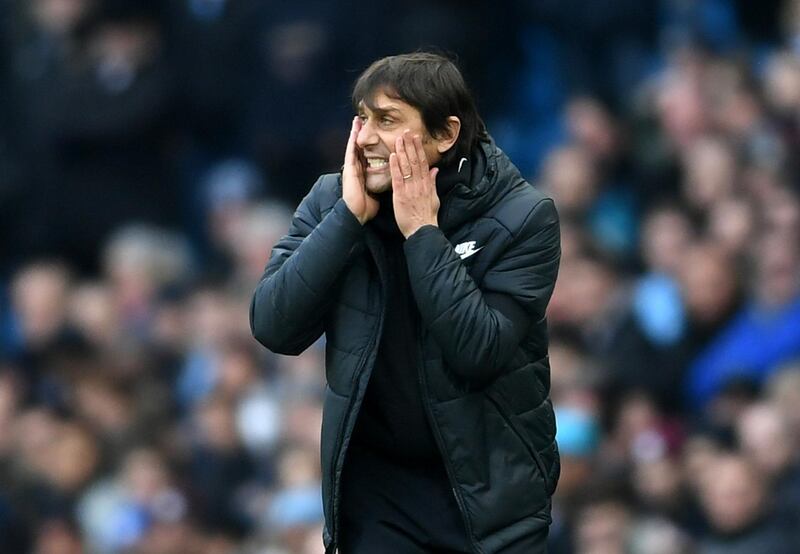The story is that Roman Abramovich decided to buy a football club after a coruscating display of attacking in Manchester.
The Russian was at Old Trafford for the 2003 night when the Brazilian Ronaldo scored a hat-trick, Manchester United won 4-3 and Real Madrid still progressed to the Uefa Champions League semi-finals.
If the Chelsea teams Abramovich has owned have rarely been described as the gold standard for carefree entertainment, their streetwise streak perhaps frustrating their benefactor, they have arguably never been more tedious than they were on Sunday in Manchester.
For the first time since such statistics were collated in 2004, Chelsea failed to record a shot on target. Their passiveness permitted Manchester City to complete a divisional record of 902 passes. Antonio Conte’s defeatism led to another defeat.
Much was understandably made of the Chelsea manager’s subsequent exchange of verbal warfare with television pundits. His most pertinent post-match comment may actually have been: “When you play against City you have to use your brain, otherwise you risk to finish the game in a bad way and to lose 3-0 or 4-0.”
_______________
Read more
[ Manchester City's Sunday stroll against Chelsea more evidence of the shifting balance of power ]
[ Antonio Conte: Chelsea have failed to match my ambitions ]
[ Costacurta thinks Chelsea's Conte 'is the one who could do the best' to manage Italy ]
_______________
And, yes, City can beat teams 3-0; indeed, as Conte noted, they had beaten Arsenal 3-0 twice within the space of five days, whereas his side only lost 1-0. Yet there is a point where pragmatism stops being pragmatic.
It is the juncture where a realist’s understanding of the threats an opponent poses becomes a pessimist’s fearfulness of their abilities which inhibits his own side by preventing them doing anything constructive.
An alternative interpretation is that while Chelsea may lost a more open game or a match when they demonstrated more attacking intent, it may have been 3-2 or 4-2. Instead, it was as though Conte felt one aspect of the scoreline was pre-determined: Chelsea nil.
And that shows a remarkable negativity and an instructive lack of faith in his attack-minded players. Consider the cast list that was available to him.
Eden Hazard has been the finest creative player in England in two of the last three full seasons. Cesc Fabregas has the second most assists in Premier League history. Pedro scored 99 goals and won three Champions Leagues with Barcelona.
Willian had struck against Barcelona and Manchester United in his two previous appearances. Alvaro Morata is a £57 million (Dh289m) striker who has excelled for Juventus and Real. Olivier Giroud scored a century of goals for Arsenal and might be France’s first-choice forward at the World Cup.
Rewind to the summer, before City’s superiority became entrenched, and there was a case for saying Chelsea’s attacking contingent rivalled anyone in England’s.
Conte had been defined by a creative pragmatism in his strategies, a defensive strategist finding a way to attack as, for instance, he did in Euro 2016 with essentially limited players; not this time.
City were without their best defensive midfielder, Fernandinho, with the more progressive Ilkay Gundogan standing in. They were without their two preferred left-backs, with an inexperienced converted winger, Oleksandr Zinchenko, standing in. They had a centre-back, in Aymeric Laporte, making only his fourth appearance. That could have offered opportunities to exploit; not with Conte’s mindset.
It highlighted the failure of Morata’s move; the Spaniard’s brief cameo took his recent return to five goals in 28 games. It illustrated that Conte’s policy of picking Hazard as a false nine, initially an inventive Plan B, can now backfire by stripping Chelsea of some of the strengths of their most gifted player.
Conte’s praise for Pedro and Willian who, he said, played “a fantastic game”, though neither had a shot, created a chance or completed 70 per cent of his passes, was revealing. It was as though he was ignoring the attacking side of defensively diligent players’ armoury.
And the Italian’s loss of confidence in his forward players was startling. Chelsea may never have shown such an inferiority complex in the Abramovich years. And in itself, it indicated why the Conte era is likelier to end this summer.






